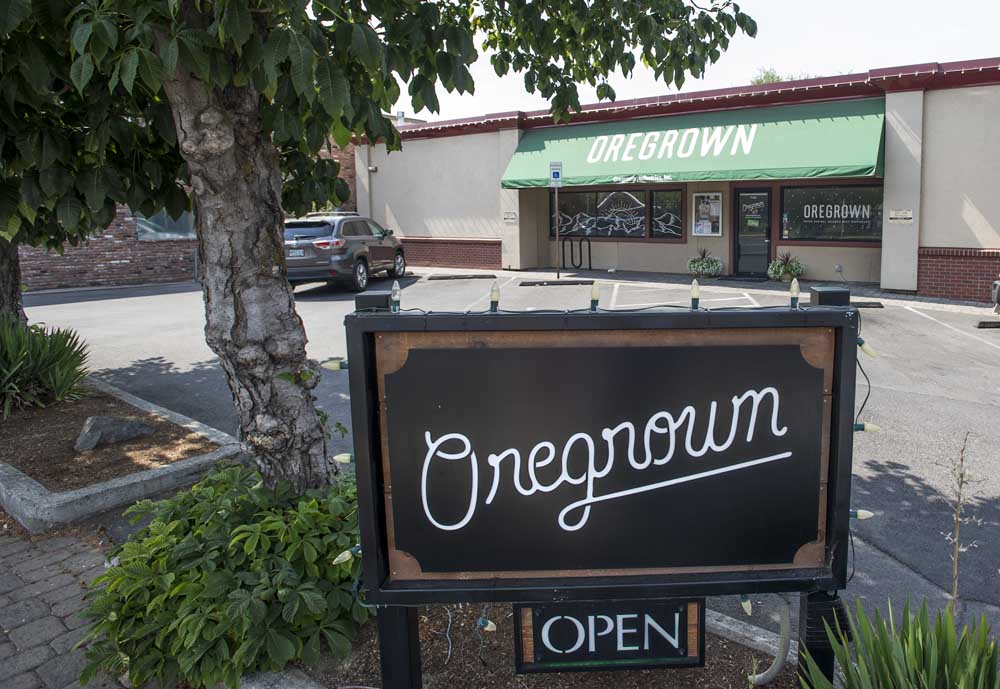Cannabis retailers in Bend face stiff competition
Published 4:00 am Sunday, March 14, 2021

- The Oregrown store at 1100-1170 NW Wall St. in Bend.
Even with robust cannabis sales that were boosted by the pandemic, Deschutes County’s 45 cannabis retailers find themselves competing for customers.
Stores try to set themselves apart by establishing personalities, locations, product variety and creating varied customer experiences. And in some cases, by selling logo wear and sustainably grown and packaged products.
Trending
“We love to meet customers who shop at other stores. Consumers can shop anywhere anytime and spend their time where they like to be,” said Jeremy Kwit, Substance cannabis store owner. “Our mission is to create a retail environment that is viscerally different than other retail business.”
Oregon is unique among the legal states for not placing a cap on the number of stores in a geographic area, creating a concentration of stores in some areas. In Oregon, like Colorado, local cities and counties can decide if they will allow cannabis stores. In Deschutes County, Redmond does not allow cannabis retailers, Jefferson County has six and Crook County doesn’t allow cannabis at all.
With each retailer needing to earn about $2.5 million in sales a year to make ends meet, there is intense pressure that could eventually lead to consolidation, said Beau Whitney, a Portland cannabis economist. In Bend, there are several retailers with multiple locations and several that have been sold to outside owners.
In Oregon, there are about 4 million people who purchased about $1.1 billion in sales of cannabis last year in the legal recreational cannabis sphere. Last year, the 753 active retailer licenses issued by the Oregon Liquor Control Commission statewide. Last year sales were a record $1.1 billion, Whitney said.
Location plays a key role in the success of a cannabis retailer, said Tom Adams, of Adams Cannabis Research in California. It’s particularly important for cannabis retailers because most of the week’s worth of business is done on Fridays and Saturdays.
“Location becomes everything,” Adams said. “If you want to be a survivor, you have to look at your location. Are you on the home-bound direction for the commuters? Is your signage visible from the street?”
Trending
Oregrown, one of several long-standing cannabis companies founded in Bend, has decided to set itself apart from the pack by promoting its sustainable packaging and farming practices on its 84-acre farm in Tumalo that is located on former goat cheese farm built on a pumice mine.
The retailer piv oted to sustainable packaging when Hunter Neubauer, co-founder and chairman of the board of directors, saw one of his store’s packages tossed on a hiking trail in Portland.
“The last thing I want to see is the cannabis industry to become a detriment to our community,” Neubauer said. “It was hard to see.”
Oregrown, with four locations in Bend, Cannon Beach, Portland and one soon in Eugene, is vertically integrated, which means it owns all stages of the supply chain, rather than working with a third party. That helps it retain profits and control revenues.
“It allows for more profits because the way cannabis is taxed now you can reduce your tax liabilities at the federal level because you can pass on your costs from one process to another,” Whitney said.
“Selling your own-grown product is a benefit.”
In Bend, the competition is keen for cannabis and beer, Neubauer said. As the legal recreational cannabis industry ages, there will be a consolidation of companies that will provide insight into how to survive in such a competitive market.
Promoting the sustainability practices in farming and packing felt right for Oregrown, Neubauer said.
“What we’ve learned over the past six years has given us the ability to hone our processes and practices and to be ready to expand to other states to sell quality craft products and experiences when the federal restrictions are lifted,” Neubauer said. “Using sustainable products differentiates us from the rest.”
Every package of cannabis, from the typeface of the label to the size of the label to the container it’s sold in is regulated by the OLCC, which approves packaging.
There’s a lot of packaging waste and plastic use, Neubauer said. To be sustainable, the company switched to earth-friendly ink printing and paper packaging. At Substance they prepackage their products so customers don’t have to wait while the product is packaged.
Prior to COVID-19, customers would be allowed to smell the product that is stored in large clear glass bell jars. Today that is not allowed and sample products are stored behind locked glass. At some stores, individual marijuana flowers are hand-selected at the time of purchase and placed in a plastic container for a customer. At others, the marijuana flower is prepackaged by weight.
Substance has three locations in Bend and is planning other locations over the next two years, said Kwit.
“We’re a retailer, that’s what we focus on,” Kwit said. “We think we’re best at retail. Cannabis is a neighborhood-oriented business. Consumers will go to their retailer that is near where they work or their sphere of travel. Our stores are where our customers live, work and travel.”








